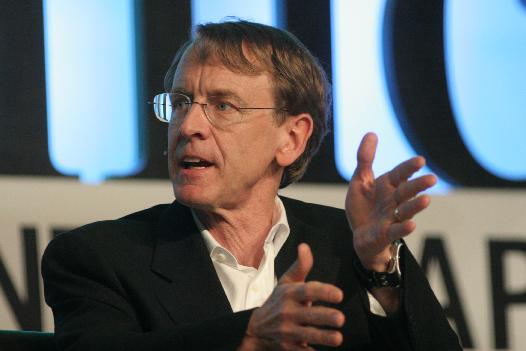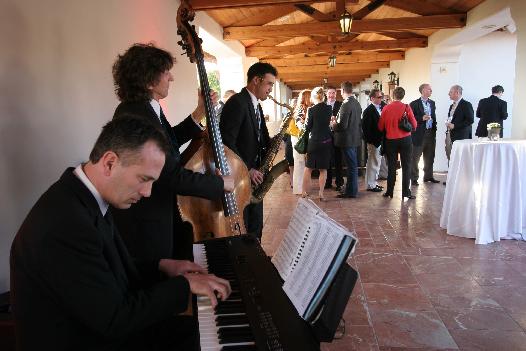Presidential Candidates’ Reps Talk Green at ECO:nomics
Energy Policy Wonks for Obama, Clinton, and McCain Share Their Visions

Everyone running for president believes that climate change is a global problem and that the next leader of the American people needs to stimulate growth in green industries. However, according to representatives for the Hilary Clinton, Barack Obama, and John McCain campaigns who spoke at Wall Street Journal‘s “ECO:nomics” conference on Thursday night, the right paths to getting there might be quite different.
Speaking on the topic “From Kyoto to Bali to Washington: Policy and Politics” were Jason Grumet, Barack Obama’s principal energy advisor; Douglas Holtz-Eakin, John McCain’s policy director, and Gene Sperling, Hilary Clinton’s chief economic policy advisor. Much of the discussion focused on the emissions trading market, pitting cap and trade versus a carbon tax, and environmental policies that are more obscure to the layperson. But the talk also touched upon each candidate’s taste for nuclear energy, and addressed some of the candidates’ general policies as well.
For McCain, Holtz-Eakin touted the market-will-solve-all philosophy, tossing aside any options for what he called “redundant regulation” that “will cripple the ability of the American business community to respond to this.” He summed up McCain’s strategy as, “Pick the policy. Believe in the market. Let it go.” McCain’s belief is that the nation’s energy policy is very much part of the overall security situation, so solving it is a fundamental aspect of protecting the country. As for the possibility of going nuclear, Holtz-Eakin said, “The nuclear problem is a political problem.” He argued that the storage is there, the technology is there, and that it should be implemented as part of solving energy woes.
Obama and Clinton, not surprisingly, sang similar tunes. But Clinton’s rep Sperling tried to set his candidate apart by stressing the populist idea of eco-mindedness. He said that she is in favor of “setting up structures that empower the typical person so that they can make choices that move toward a greater low carbon future.” He later added, “What’s more exciting is to have the next president create a vision for the typical person that is full of additional choices, that they can see in those additional choices not only the chance to participate:but ways they can understand to keep the costs down.” As for the nuclear question, Sperling flatly said “no” when asked if Clinton was considering that as part of the future.
Obama’s rep Grumet was more open to the nuclear issue, explaining that while there are big problems with nuclear, Obama “also believes there are equally significant problems with massive scale renewable:When you look at the challenge of climate change, his view is we have to be aggressive to overcome those problems.” Grumet was also more open about higher gas prices due to a carbon tax and more regulations, saying, “You can have Lord of the Flies or you can have a government that tries to do things for the collective good.” He spoke about getting a social movement in action to confront climate change, which is needed for combating such a huge problem.
After a long, informative Q&A session, the audience was asked to vote for their favorite of the three candidates. The result of the heavy capitalist, eco-minded crowd was 42 percent Obama, 41 percent McCain, and 17 percent Clinton. And then they revoted, with the results: 42 percent McCain, 41 percent Obama, an 17 percent Clinton. Laughter ensued.
Venture Capitalist Calls Green Tech the “Largest Economic Opportunity
Prior to breaking for dinner, there was an invigorating, enlightening conversation with John Doerr, a venture capitalist with Kleiner Perkins Caufield and Byers who throws $700 million or so at entrepreneurs he believes in. The talk’s topic was “Green Deals: The Environmental Factor in Corporate Investments,” and Doerr spoke frankly about his confidence in the future of green technologies. And as an investor who’s supported everyone from Internet heroes Google and Amazon to high tech companies Compaq and Sun Microsystems, his opinion is golden.

Motivated dually by both the need to make money for his firm, which supports the endowments of American universities and other investors, and his obvious concern for the goodwill of the planet, Doerr said that the green industry has much promise. “What’s very attractive about green technologies is that the markets are enormous,” said Doerr the capitalist. Later, from his humanitarian side, he added, “You can do work that’s successful but also significant.” Repeating a theme that’s run throughout the conference, Doerr stressed the need for a diversity of solutions, and said, “The solutions to this problem are all going to come from cars, from coal, from conservation (and efficiency), and from cattle.” (Livestock account for about 18 percent of the greenhouse gas emissions today.)
Compared to the low price tag, fast pay-off of investing in information technologies like Google and the billions required plus decade of waiting for biotech investments, Doerr said green technologies are somewhere in the middle, taking about $250 million in funding and between five to seven years to see that money become profitable. He criticized the government’s weak contributions to funding green R&D products, and chided some in industry as well. “This is the largest economic opportunity of the 21st century,” said Doerr.
More ECO:nomics Highlights
Leading up to the evening session on Thursday night, here are some highlights from the conference, as reported by this newspaper and others:

• Wal-Mart Exec admits “we are not green”
• Dow Chemical head predicts worse American economy than previously thought
• Rainforest Action Network infiltrates conference, attacks biofuels; and another take here
• What do shareholders want in green investing?
• General Electric CEO Jeffrey Immelt is frustrated by lack of green growth in industry



